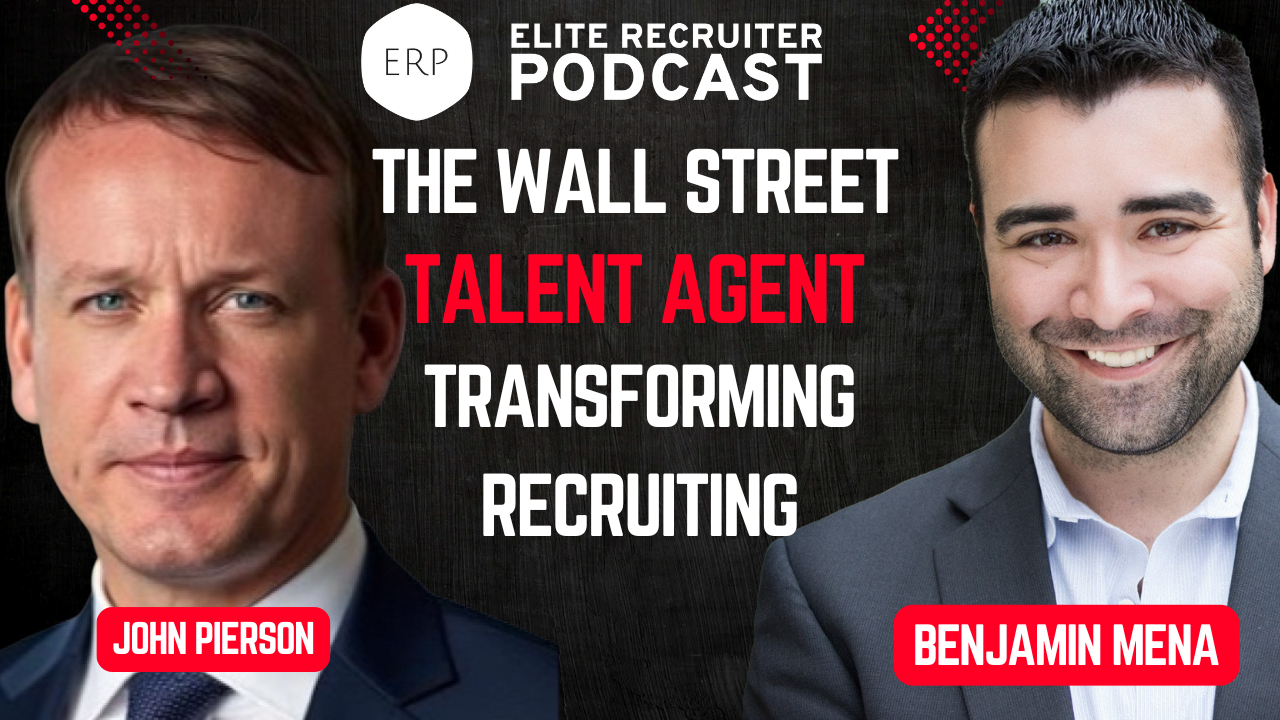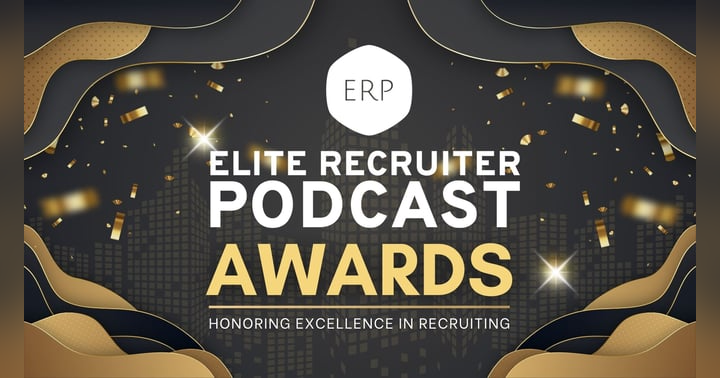The Wall Street Talent Agent Redefining Recruiting: John Pierson on Risk, Grit, and Long-Term Talent Advising

The Wall Street Talent Agent Redefining Recruiting: John Pierson on Risk, Grit, and Long-Term Talent Advising
John Pierson’s journey into recruiting is anything but typical. A former U.S. Marine and air traffic controller for the Presidential helicopter squad, Pierson moved to New York City on a whim after finishing his service. In an almost cinematic twist, he literally landed a Wall Street job at a bar – a chance meeting scored him an assistant role despite having “zero experience in finance whatsoever”. Trading wasn’t his calling (“I wasn’t very good. I was quite bad,” he laughs), but working with people was. That realization catapulted Pierson into the recruiting world, where he found his true niche. Within a few years, he evolved from a rookie headhunter into what he calls a “talent advisor” – even shunning the word recruiter for the high-level, agent-style model he was building.
Early in his career, Pierson cut his teeth at a boutique search firm that taught him the power of bold risk-taking. “Kick doors down and don’t take no” was the ethos he absorbed, crediting risk as “one of the best lessons I’ve ever learned in this career”. That fearless mindset, combined with his Marine-honed discipline and communication skills, set the stage for a new kind of recruiting practice – one focused on long-term relationships and big-picture career moves rather than quick placements.
Becoming the “PM Agent” – A New Model for High Finance Hiring
By the early 2000s, Pierson found his sweet spot in the hedge fund and investment world. He zeroed in on a niche – placing elite portfolio managers and technologists – and branded himself as a “PM agent,” essentially a portfolio manager’s agent on Wall Street. Like a sports or Hollywood agent for top talent, Pierson’s role was to represent the candidate (the star performer) as much as the client. This was a radical shift from the typical transactional recruiter mentality.
Working at large recruiting firms, Pierson had seen an overly salesy, numbers-driven approach that treated candidates as commodities. He wanted none of that. “I felt there was a need for a new type of service and a new type of product,” he says – something bespoke, high-touch, and “beyond the commission”. Instead of the usual churn and burn, Pierson chose to play the long game. He became unapologetically candidate-centric, sometimes starting a relationship “two years from when someone’s going to make a move” so he could truly understand their aspirations before guiding their next step.
This candidate-first philosophy is rooted in integrity. Pierson refuses to push a placement if it’s not a genuine fit – “We could churn and burn and make a lot [of money], but those people are going to get upset because they’ll end up in places that weren’t proper for their progression,” he explains. He’s blunt about it: “I don’t want unhappy people.” Rather, the goal is to ensure every move is a win–win for the talent and the employer. In Pierson’s eyes, a recruiter’s reputation follows every placement. “Everyone in this world is a marketer,” he says. “They’re either going to say things pro–P2 or against P2.” (P2 Investments is Pierson’s firm.) By prioritizing trust and long-term happiness, he ensures that former candidates become future clients and enthusiastic referral sources. The result is a relationship-driven practice built on discretion, loyalty, and mutual respect.
And if you think top Wall Street rainmakers are out actively looking for jobs, think again. Pierson actually prefers to engage talent before they hit the market. “Our philosophy is if they’re looking, something’s probably wrong,” Pierson notes. The best people are usually too busy succeeding to send out résumés – which is exactly why Pierson approaches them first, well ahead of any career move. He cultivates confidential relationships with high-performers who “aren’t looking” so that when the time is right, he can artfully broker the perfect next step on their behalf.
The 4-Step “Agent Approach” to Talent Advising
To serve senior financial candidates at this level, Pierson developed what he calls the “agent approach” – a four-part framework that mirrors how an agent manages an athlete or actor’s career. It’s a step-by-step playbook for long-term talent representation:
- Introduction: The first conversation is a get-to-know-you introduction – “think of a newspaper, you don’t read the article, you just look at the headlines,” Pierson says. In this brief call, he learns the headline of the candidate’s story and shares his own, just to see if there’s synergy and a mutual interest in building a relationship.
- Collaboration: Next comes deep discovery. Pierson collects a résumé, bio, or other background info and even has candidates fill out a detailed profile questionnaire. This is a collaborative process – he works with the individual to develop their personal career story and target list. “We don’t search for anybody, we search with everybody,” Pierson emphasizes. The candidate effectively becomes part of the search team, co-creating a strategic plan for which firms or opportunities to pursue (whether via active mandates Pierson has or opportunistic outreach).
- Anonymous Representation: This is where Pierson truly acts as an agent. He represents the candidate confidentially and anonymously to gauge interest from select hiring managers without ever exposing the person’s identity or resume up front. Instead of blasting out credentials, Pierson personally tells the candidate’s story to potential employers, protecting both parties’ privacy until there’s strong mutual interest. It’s a highly nuanced dance: “There are so many things that can go wrong. That’s why a resume doesn’t work anymore,” he explains. Rather than rely on a static CV, Pierson crafts a narrative around the individual’s unique value – effectively shopping the opportunity “off-market”. Only once a target firm signals serious interest does he reveal the candidate’s identity and facilitate a meeting. By acting as a buffer and storyteller, he allows executives to explore career moves safely and selectively. In Pierson’s world, “we don’t want a block of ice, we want a sculpture. We want precision.” Each candidate’s presentation is carefully shaped and customized, never one-size-fits-all.
- Lifelong Advisory: The final step is perhaps Pierson’s favorite. If you work with him, it’s not just for one placement – it’s for every stage of your career. “We want to talk to you from introduction today until you retire,” he says earnestly. In practice, this means staying in touch for years, offering guidance on promotions, team-building, and even hiring for your own group once you’re in leadership. “Our candidates become our clients,” Pierson notes, describing how a junior professional he helps today might later call him to help staff their firm. This “career agent” model creates a virtuous cycle of trust and repeat business. It’s also a savvy long play: by investing in people early (often even at the college or MBA stage), Pierson establishes himself as a lifelong advisor so that when his candidates-turned-clients need talent, he’s the first call. It’s a markedly different vision of recruiting – one measured in decades-long relationships and career trajectory sculpting.
Risk & Grit: No Reward Without Bold Moves
One theme that threads through Pierson’s story is courage. In an industry known for KPIs and caution, Pierson’s philosophy is to bet on yourself and take chances – because that’s where the big breakthroughs happen. His own career inflection points were a direct result of bold risks.
Take the anecdote of how he landed a job at a top search firm: On the way to the interview, he spilled coffee on his only suit. Rather than show up stained, he scrambled into the meeting wearing khakis and a blazer – and got questioned about not dressing formally. Pierson didn’t miss a beat. “I’ll go change if you want,” he offered, “but I’ll tell you one thing – nobody you interview today is going to be able to change into my skill set.” The audacious reply stunned the interviewer (and probably violated every HR book rule), but it also got him hired on the spot. Pierson’s takeaway: have the confidence to stand by your unique value, even if it means defying convention.
A few years later, he doubled down on that audacity to drum up business for his nascent firm. In what has now become Elite Recruiter Podcast lore, Pierson cold-called billionaire investor Dan Loeb at 6:45am in the morning – completely unannounced – to pitch himself as a recruiter. “I’m one of those talent people you probably hang up on all the time,” he told Loeb’s surprised voicemail. “I just want one mandate in one week. If I fill it, hire me. If I don’t, never talk to me again.” It was a gutsy 10-second pitch to one of Wall Street’s legends. Loeb gave him a shot, and Pierson delivered – filling the role in days. The reward? A long-term relationship with a premier hedge fund and proof that fortunes favor the bold.
Pierson preaches this to others in the field: take more swings, even if it means occasional failure. “You gotta take risk,” he insists, “because when you take risk, if you trip and fall down on your face… the way I see it is you’re in the push-up position. You just get stronger.” In other words, every misstep is an opportunity to build muscle for the next challenge. This resilience and willingness to fail forward has clearly set him apart. “You can’t be typical in this industry. Never, ever be typical,” Pierson says. He encourages recruiters to be creative, be brave, and occasionally even be a little contrarian – whether that’s calling a CEO before dawn or simply refusing to follow the herd. In a field crowded with lookalike agencies, Pierson’s story is a case study in how calculated risk and a bit of swagger can redefine your career trajectory.
Key Strategies from Pierson’s Playbook: Niche, Hustle, and Storytelling
Beyond the big-picture philosophy, John Pierson’s success is underpinned by some tactical strategies that any recruiter or talent professional can learn from:
- Niche Positioning: “The generalist has gone away,” says Pierson – especially in high-end recruiting. He credits a key early mentor for teaching him to find a niche and become the expert in it. For him, that meant focusing exclusively on hedge fund investment and technology roles. By specializing deeply, he gained credibility among elite candidates and clients who see him as “the go-to guy” in that arena. The takeaway: in today’s market, clients want a specialist, not a jack-of-all-trades. Plant your flag in a domain you’re passionate about and commit to knowing it better than anyone else.
- Proactive Outbound Hustle: Pierson’s rise is a masterclass in sheer hustle. When he started his firm in 2007, he didn’t sit around hoping for referrals – he went all-out to drum up business. “I guerrilla marketed,” he says of landing his first clients. “I sent letters, I emailed, I FedExed them, I called them, I found out where they went to the gym, I volunteered. I did everything you could possibly think of.” This relentless, multi-channel outreach netted him several clients and $250K in revenue within six months of starting from scratch. The lesson? Leave no stone unturned. Especially in the beginning (or in a down market), success comes from consistently making your own opportunities. Even today, Pierson finds creative ways to reach top talent – for instance, timing emails for very early morning so he’s the first message they see. It’s this kind of thoughtful, persistent outbound effort that fills his pipeline with people no one else is talking to.
- Deep Candidate Storytelling: In Pierson’s view, recruiting at the top level is 90% narrative. It’s not enough to have a great résumé – “A resume doesn’t work anymore,” he says plainly. To intrigue a world-class fund or a cutting-edge startup about a happily employed star, you need a compelling story. Pierson positions himself as a biographer and advocate for his candidates: he teases out their most impressive achievements, crafts a vision of their potential, and frames it all in a way that resonates with the target firm’s needs. He and his team even help candidates refine their personal “pitch decks” and backgrounds during the collaboration phase. Think of it like turning a block of raw marble into a statue – “You don’t want a block of ice, you want a sculpture,” Pierson analogizes. Every outreach is precise and personalized. By controlling the narrative, Pierson can present a candidate in the best light and handle objections or concerns in conversation – something a static CV can’t do. The power of story is what allows him to place people in roles that weren’t even advertised. For recruiters, the takeaway is to elevate your role from resume broker to talent storyteller – it’s in the nuanced telling of someone’s career journey and capabilities that you create real excitement and demand.
The Human Touch in an AI-Driven World
In an era obsessed with AI and automation, Pierson offers a refreshing reminder: high-stakes hiring is profoundly human. He leverages plenty of tech (AI-driven CRMs, analytics, etc.), but he firmly believes the core of his business – building trust, advising on life-changing moves, and negotiating delicate win-win outcomes – cannot be handed off to algorithms. “We could talk about AI all day long… [but] there’s nothing more nuanced than a human being,” Pierson says. The art of gauging a person’s true motivations, persuading a reluctant superstar to consider a new opportunity, or calming a client’s nerves about a risky hire – these are complex emotional equations that require empathy, insight, and adaptive finesse. In other words, an AI might crunch data on candidates, but it won’t replace the gut instincts and relationship capital of a seasoned recruiter when it comes to sealing the deal. Pierson’s talent agent model thrives on those very nuances: the off-record confidences, the “read between the lines” moments, the trust that is built over years. Technology for him is a tool to augment reach and efficiency, but the edge in his work is decidedly human. For anyone worried that AI will take over recruiting, Pierson’s approach is a case study in how expertise, personal connection and high-integrity advocacy remain irreplaceable.
🎙️ Listen to John’s Episode & Join the Summit
John Pierson’s story is a wake-up call that recruiting at the highest levels isn’t about filling roles – it’s about shaping careers and forging partnerships built on integrity. If you found these insights valuable, just wait until you hear them straight from John himself. Tune in to the full conversation on The Elite Recruiter Podcast (Episode: “The Wall Street Talent Agent: Redefining Recruiting”) to dive deeper into his journey, mindset, and tactics. You’ll hear even more gems (and great stories) in his own words.
Spotify: https://open.spotify.com/episode/4ix836xApTucuJDjzBZa8W?si=yHnmxlN5Tp2BQq_2TRlIRQ
Apple Podcast: https://podcasts.apple.com/us/podcast/the-wall-street-talent-agent-redefining-recruiting/id1547241660?i=1000734191861
YouTube: https://youtu.be/ypyXKJlne3s
👉 Listen to the podcast episode for the full story and tactical takeaways. And while you’re at it, don’t miss the chance to learn from other top producers live: register for the upcoming Sales & Business Development Recruiter Summit – a free virtual event hosted by The Elite Recruiter team. It’s happening soon, and it’s packed with sessions to help you level up your recruiting game in 2025. Whether you’re looking to sharpen your sales strategy, adopt new tech (like Atlas, below), or build a personal brand, the summit has you covered. Secure your spot and come network with the best – let’s start 2025 stronger than ever!
Summit Free Registration: https://bd-sales-recruiter-2026.heysummit.com/
🚀 Sponsorship: Atlas Tired of clunky, inflexible recruiting software that’s stuck in 2015? Atlas is here to change that. Built by recruiters for recruiters, Atlas is the all-in-one operating system that’s fast, modern, and beautifully designed to help you place more talent with less friction.
Whether you’re a solo recruiter or scaling a team, Atlas helps you:
- Track every touchpoint without the bloat
- Run faster searches with intuitive AI
- Manage your pipeline with less clicking, more doing
It’s everything you need, nothing you don’t. See it in action here → https://recruitwithatlas.com/









